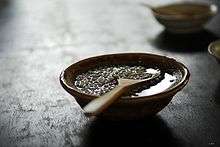Lei cha
Lei cha (Chinese: 擂茶; pinyin: léi chá; lit.: 'Thunder tea'; pronounced [lěi ʈʂʰǎ]) or ground tea is a traditional Southern Chinese tea-based beverage or gruel. The custom of Lei cha began in the Three Kingdoms period or even Han Dynasty. It is very prevalent among Hakka people in Hakka regions of Taiwan. It is brought by Hakka people to Taiwan, Indonesia, Malaysia, and any locales with a substantial Hakka diaspora population. Besides Hakka Lei cha, Lei cha is also very traditional among Hunanese people in Northern part of Hunan Province of Mainland China. So, the Lei cha custom in China has two different kinds: Hakka Lei cha; and Hunan Lei cha.

| Lei cha | |||||||||||
|---|---|---|---|---|---|---|---|---|---|---|---|
| Traditional Chinese | 擂茶 | ||||||||||
| Simplified Chinese | 擂茶 | ||||||||||
| |||||||||||
Lei cha is not the same as Taiwanese tea because there are always other ingredients. Ground tea consists of a mix of tea leaves and herbs that are ground together with various roasted nuts, seeds, grains, and flavorings.
Production
Although Lei cha can be bought commercially prepared and prepackaged, the drink is usually made "from scratch" just as it is about to be consumed.
Local values
It originally started from local people treating guests this type of drinks, which serves both meat and veggie options. The reason it was related to their local culture is that, the local people were known to always be hustling, they hustle for a better living, just like how hard they work to get the best and diverse ingredients for this drink.
Popular areas
Hunan, Jiangxi, Guangdong, Guangxi, Fujian and Taiwan.
Ingredients and preparation
Ground tea is a varying mix of:
- Tea leaves – any type of tea leaf can be used, but the most popular and common are either Green tea or Oolong; for ease of use, sometimes matcha (finely milled green tea) is used
- Roasted nuts, legumes and seeds – the most commonly used are peanuts, mung beans, and sesame; other examples include soybeans, pinenuts, Pumpkin seeds, sunflower seeds, Lentils, lotus seeds
- Roasted grains – examples: cooked or puffed rice, wheat
- Herbs and flavorings – examples: ginger, salt
- Chinese herbal medicine may be included for health purposes
The ingredients are ground in a food processor, or with a mortar and pestle, or in a large earthenware basin with a wooden stick. The mix should be reduced to a powder that resembles fine cornmeal.
The powder is then placed into a serving bowl and hot water is stirred into it such that a thin soup-like beverage is produced.
Consumption
The tea is drunk for breakfast or on cold winters as a tasty and healthy restorative.
Lei cha may also be taken as a dietary brew. In that case, it is served with rice and other vegetarian side dishes such as greens, tofu, and pickled radish. A variety of Lei Cha popular as Khai Lang Lei Cha is a part of street food in Malaysia.
Traditionally, Lei cha is a savory brew; however, in contemporary interpretations it is often consumed as a sweet drink.
Now Lei Cha is also serve as a main dish for lunch or dinner, where Chinese would sit around a big round table with their family and enjoy Lei Cha.